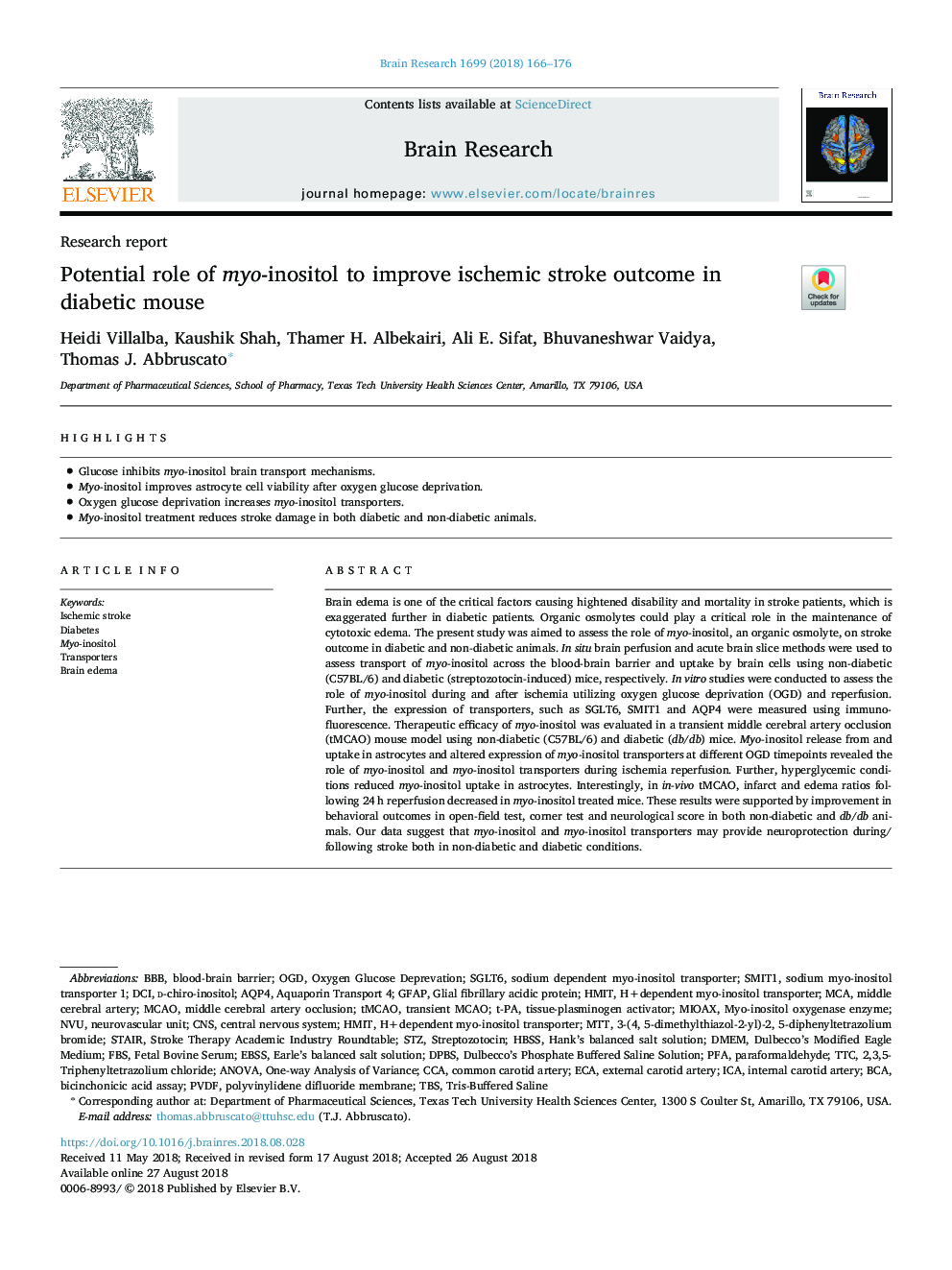| Article ID | Journal | Published Year | Pages | File Type |
|---|---|---|---|---|
| 10106915 | Brain Research | 2018 | 11 Pages |
Abstract
Brain edema is one of the critical factors causing hightened disability and mortality in stroke patients, which is exaggerated further in diabetic patients. Organic osmolytes could play a critical role in the maintenance of cytotoxic edema. The present study was aimed to assess the role of myo-inositol, an organic osmolyte, on stroke outcome in diabetic and non-diabetic animals. In situ brain perfusion and acute brain slice methods were used to assess transport of myo-inositol across the blood-brain barrier and uptake by brain cells using non-diabetic (C57BL/6) and diabetic (streptozotocin-induced) mice, respectively. In vitro studies were conducted to assess the role of myo-inositol during and after ischemia utilizing oxygen glucose deprivation (OGD) and reperfusion. Further, the expression of transporters, such as SGLT6, SMIT1 and AQP4 were measured using immunofluorescence. Therapeutic efficacy of myo-inositol was evaluated in a transient middle cerebral artery occlusion (tMCAO) mouse model using non-diabetic (C57BL/6) and diabetic (db/db) mice. Myo-inositol release from and uptake in astrocytes and altered expression of myo-inositol transporters at different OGD timepoints revealed the role of myo-inositol and myo-inositol transporters during ischemia reperfusion. Further, hyperglycemic conditions reduced myo-inositol uptake in astrocytes. Interestingly, in in-vivo tMCAO, infarct and edema ratios following 24â¯h reperfusion decreased in myo-inositol treated mice. These results were supported by improvement in behavioral outcomes in open-field test, corner test and neurological score in both non-diabetic and db/db animals. Our data suggest that myo-inositol and myo-inositol transporters may provide neuroprotection during/following stroke both in non-diabetic and diabetic conditions.
Keywords
BCANVUEBSSAQP4STZTMCAOMCAOTransient MCAODCIOGDPFAHBSSt-PATTCCCAd-chiro-inositolDPBSFBSICAECADMEMPVDFGFAPMCATBS2,3,5-triphenyltetrazolium chloride3-(4, 5-dimethylthiazol-2-yl)-2, 5-diphenyltetrazolium bromideDulbecco’s modified Eagle mediumMTTBrain edemastreptozotocinmiddle cerebral artery occlusionDiabetesANOVAone-way analysis of varianceTris-buffered salineTransportersCNSEarle’s Balanced Salt SolutionBBBfetal bovine serumIschemic strokeStroke Therapy Academic Industry Roundtablecentral nervous systemmiddle cerebral arteryexternal carotid arteryinternal carotid arterycommon carotid arteryPolyvinylidene difluoride membraneTissue-plasminogen activatorBlood-brain barrierHank’s balanced salt solutionMyo-inositolneurovascular unitparaformaldehydeGlial fibrillary acidic proteinStair
Related Topics
Life Sciences
Neuroscience
Neuroscience (General)
Authors
Heidi Villalba, Kaushik Shah, Thamer H. Albekairi, Ali E. Sifat, Bhuvaneshwar Vaidya, Thomas J. Abbruscato,
